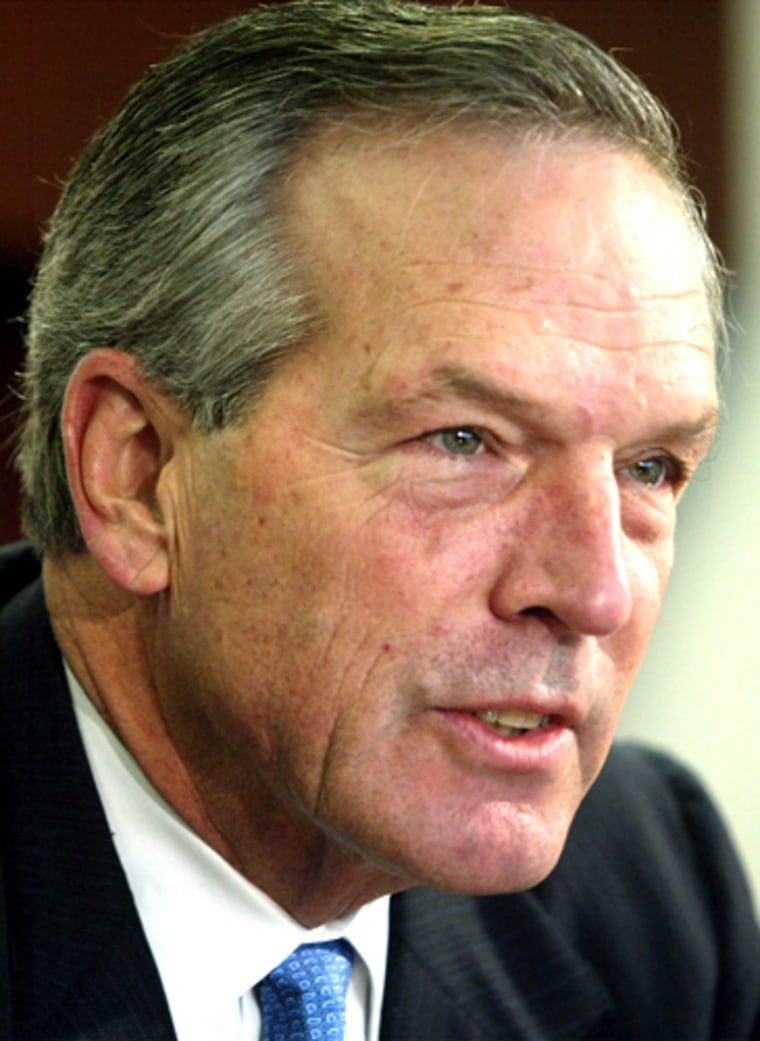The Bush administration wants China to crack down on the rampant piracy of U.S. movies, music and computer programs and will not be satisfied until copyright violators get stiff prison sentences, Commerce Secretary Donald Evans said.
Evans, who on Monday was leaving on his fourth and final trip to China as a member of President Bush’s Cabinet, said in Associated Press interview that he wanted to learn firsthand what China was doing to fulfill promises to better enforce its intellectual property laws.
Chinese Vice Premier Wu Yi led a 70-person delegation to Washington last April for economic talks that resulted in a number of pledges by the Chinese on trade, including protections for U.S. copyrights.
The Motion Picture Association estimates that its members lost up to $3.5 billion last year from movie pirates. China is considered the second worst offender behind Russia.
Evans said even though the Chinese government had committed to specific steps to combat piracy, the United States was concerned about the lack of significant criminal prosecutions.
‘We haven't seen enough evidence’
He said the administration wants to see “jail time and tough criminal actions against those responsible for the thefts. ... We haven’t seen enough evidence that this is happening yet.”
Evans said he would emphasize this point during meetings with Chinese leaders and in a speech Thursday at an intellectual property conference in Beijing.
During Bush’s second term, the United States will keep the pressure on China to abide by the market-opening commitments it made upon joining the World Trade Organization, Evans said.
That effort, he said, will continue under Carlos Gutierrez, the president’s nominee for commerce secretary. The head of cereal giant Kellogg is awaiting Senate approval to take over for Evans.
Evans, a close friend of Bush, said in November he was leaving the Cabinet to return to Texas.
Gutierrez told lawmakers last week that the administration intended to press China to narrow the trade gap with the United States. That imbalance hit $124 billion in 2003, a record for any U.S. trading partner, and widened in 2004.
Bush policies under fire
Critics of the administration’s trade policies contend that Bush has not done enough to protect American workers from unfair trade practices in other nations. Those practices have contributed greatly to the loss of 2.7 million U.S. manufacturing jobs over the past four years, these critics say.
In the interview, Evans said he was not disappointed by the growth in the overall trade deficit and the deficit with China. He said he saw it as “an ongoing challenge to make sure that we do all we can to eliminate not only tariff barriers but nontariff barriers with China.”
U.S. manufacturers say the best thing the administration could do for the industry would be to persuade China to stop linking its currency directly to the U.S. dollar. American companies say that as a result of that system, the Chinese yuan is undervalued by as much as 40 percent, giving Beijing a huge competitive advantage.
Evans said currency issues would not come up directly in his conversations with Chinese leaders because Treasury Secretary John Snow is handling that policy matter for the administration.
Chinese seek market-economy designation
But Evans said he would raise with the Chinese the additional steps needed, such as selling off state-owned enterprises, so China can be classified by the United States as a market economy.
The Chinese want this designation because it will make it harder for American companies to win claims that Chinese competitors are setting unfairly low prices on goods sold in the U.S. market.
“It is very important to them to be classified as a market economy under our trade laws and they are not there yet,” Evans said.
Evans said all of these efforts to boost U.S. export sales to China would continue in Bush’s second term.
“I will make it clear that even though we have had a presidential election nothing has changed,” he said. “We still want to continue working to integrate China into the global economy.”
